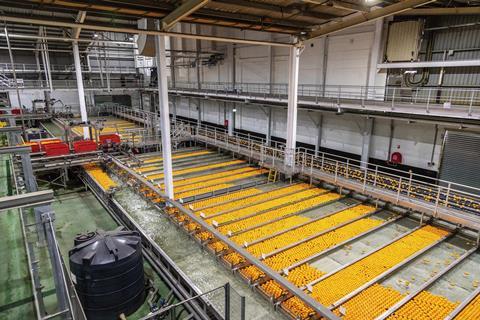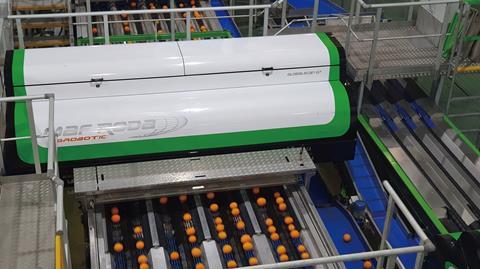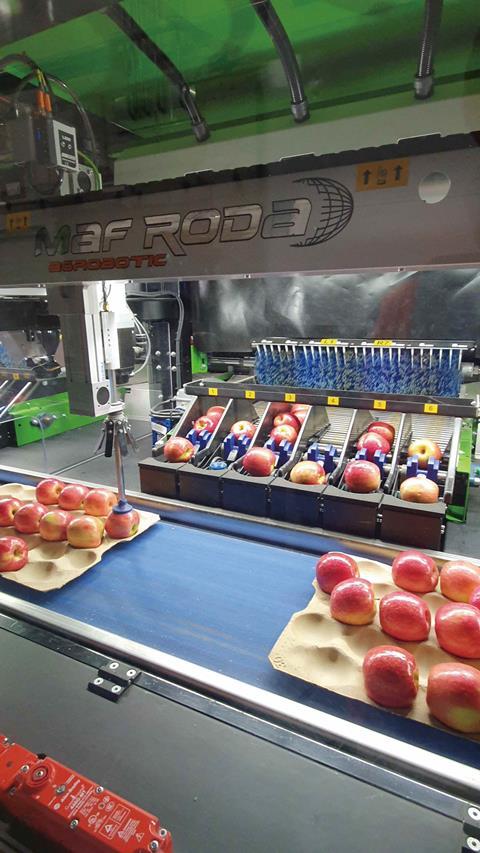Redland’s packhouse is the largest Maf Roda installation in the Southern Hemisphere and is setting new standards for efficiency and automation
As fruit travels through Redland’s packhouse in Shepparton, Australia, the lack of a human touch is apparent. A mixture of apples, pears and citrus flows through graders and water pre-sizers before being loaded into bins and whisked off to storage on a fully automated high-bay, integrated with a monorail. An automated storage and retrieval system (ASRS) precisely switches bins in and out before sending fruit off to automated packing lines that work away at a constant pace.

The entire facility has been outfitted by Maf Roda and Maf Oceania, and it represents one of the company’s most sophisticated installations worldwide.
Speaking with Produce Plus, technical sales director Frederic Scellier says every design decision was made to help deliver efficiency across the three main sections of the facility: pre-sizing, automatic storage and packing.
“The packing process at Redland is completely automatic, you have no forklifts once the fruit is dropped off until palletisation at the end of the process,” says Scellier.
“The main question driving new projects is how do we save labour. It is not only a question of the quality of pre-sizing, but the customer focus is how to save money.”
Quality and flexibility
When this installation was first commissioned in 2021, apples and pears represented the vast majority of fruit packed in the facility. Redland acquired the packhouse in 2023 with plans to update the facility to cater for its citrus production in addition to apple and pear packing.
Scellier says the packhouse has been able to smoothly handle the added requirements thanks to a bit of innovation.
“To pack citrus and to pack apples is not the same at all. Citrus is more complicated than apples and has a more complicated fungicide treatment,” explains Scellier.
“We updated the external grading software on Globalscan 7 and hardware and software on the internal defect detectors in order to pack citrus.
“After some minor adjustments we were also able to adapt the apple and pear water pre-sizing line to pre-size citrus as well. I think it is the first packhouse we’ve done this for in the world.”
The system can pre-size 1,000 bins a day at a rate of 60 bins per hour for citrus and 70 bins per hour for apples with the help of two eight-lane Pomone sizers and a three-lane Uniway sizer.
The water pre-sizing system has 64 flumes, can sort into more than 40 different sizes, and is serviced by a Maf-designed and produced water treatment and filtration system. Graded fruit is automatically packed into bins using a water bin filler and transported to storage.
“The target is to automatically pre-size the product to put all the same size in one bin according to diameter, colour, weight internal and external defect before it is sent to storage,” says Scellier.
Streamlined storage

After pre-sizing, full bins make their way to an imposing ASRS. Spread across two controlled atmosphere rooms, it features four retrieval robots, 25 levels and has the capacity for 5,200 bins. The Maf-designed system gives Redland a comprehensive picture of every piece of fruit in its packhouse.
“We have complete mapping of the bins. We are able to follow them through the packhouse without labels and we know what is in each bin, whether it contains apples or citrus and the quality and size,” says Scellier.
With the ability to store 140 bins an hour and retrieve 120, the ASRS delivers increased productivity, according to Scellier, reducing labour in this section of the packhouse by about 50 per cent.
Fruit removed from storage is run through one of three pre-graders to double-check quality before it is sent to pack.
Precision packing

Labour savings are also evident in the final section of the facility with six specialised packing lines that can pack fruit in boxes, punnets, bags, hat bins or bins.
The highlight of this section is a suite of Maf Roda Linepack machines with 16 automatic packing robots. Scellier says it is Maf’s largest Linepack installation in the world and the machines do more than just move fruit from one place to another.
The Linepack solution uses advanced artificial intelligence to analyse and rotate each piece of fruit so it is packed in the ideal position, increasing visual appeal and reducing potential damage.
“First the machine orientates the fruit using an overhead camera to make sure the best side of the fruit is facing up. Then the fruit is placed using a robotic arm which ensures each piece has the right orientation and all the fruit faces the same direction with the stem and calyx in line,” explains Scellier.
“These machines have been used every day since they have been installed and one robot is worth roughly one person. This installation needs only two people to pack five tonnes per hour instead of what would normally be 16.”
Automation is present across the other lines, with three speed packers installed to increase packing output. Maf also upgraded part of the existing packing lines so Redland could efficiently pack citrus and apply appropriate fungicide treatments.
Scellier says the entire process is united by a unique warehouse management system (WMS) specially developed by Maf. The WMS gives Redland visibility over every aspect of the facility helping to power efficiency gains with detailed data.
He says Maf’s ability to provide complete turnkey solutions makes complex projects like this possible. It can ensure smooth integration between each piece of equipment to enhance efficiency and provide value for fresh produce packers.



